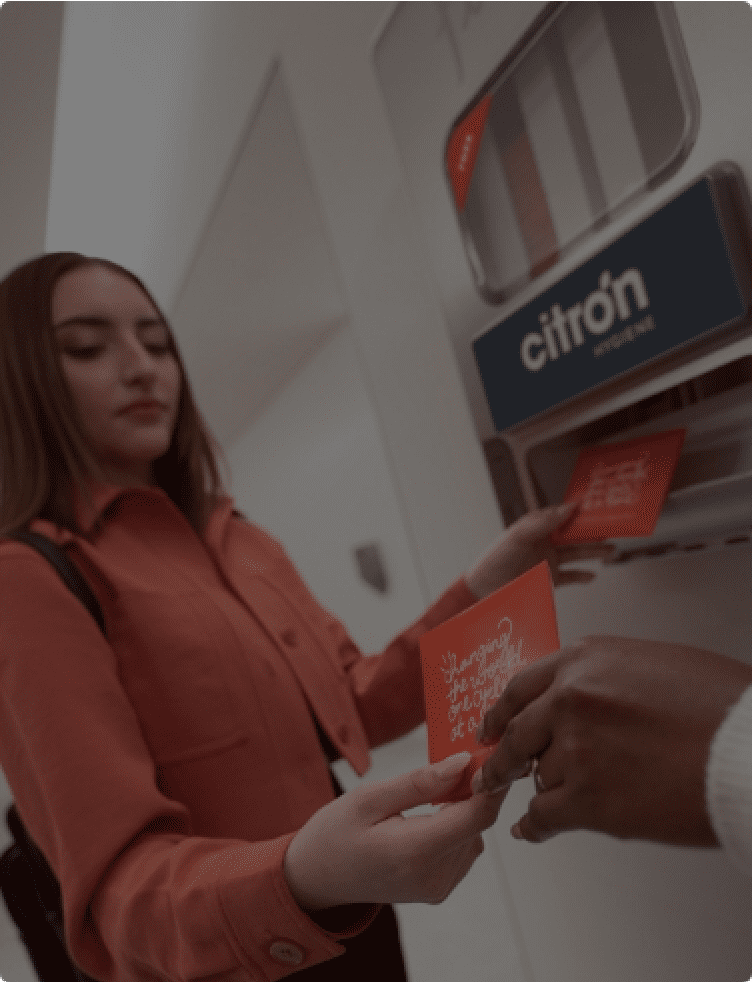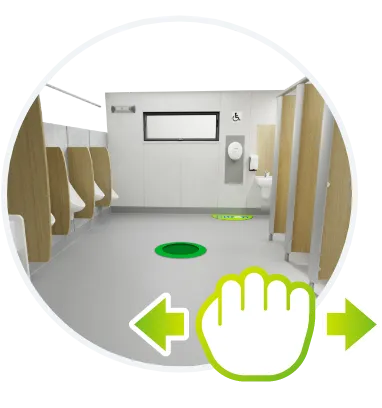Table of Contents
Washroom and Hygiene
As times change, the environments we use must change too. Unfortunately, when it comes to public washrooms, changes are not happening fast enough. It’s time to start thinking about how we can provide inclusive washrooms that are considerate towards all washroom users’ needs; many people still face a range of issues when using washrooms away from the home.
Issues faced by people when using public or workplace washrooms
Period poverty
Period poverty is described as the lack of availability of period products, most often due to financial circumstances. It’s an issue faced by millions of menstruators across the globe. As a result of the cost-of-living crisis in the UK, period products are becoming more and more unaffordable, with 32% of women worrying they will no longer be able to afford the vital products in the near future. This is having profound effect on the mental and physical health of women, with many worrying they will not have access to the products they need, when they need them.
This lack of access to the right products often causes women and girls to miss school and work due to fear of embarrassment. This is directly linked with poorer results, decreased productivity and reduced professional outcomes.
Creating an inclusive washroom for those who experience period poverty
It has never been easier for businesses to make a difference and take steps to tackle period poverty.
One of the easiest ways to support menstruators who use your washroom is to provide free period products. Access to a clean, hygienic washroom with free-vend period products will support people who need these essential items. Toilet roll and soap is made free in washrooms, why shouldn’t sanitary pads and tampons be free too?
Aunt Flow is a practical solution to providing free period products. Aunt Flow is a free-vend menstrual product dispenser that provides high quality sanitary products to your washroom users. Citron Hygiene provide an on-time, reliable restocking service to ensure pads and tampons are always available to your washroom visitors.
Provide free-vend menstrual products
Support period dignity and provide free access to pads and tampons in your business. Find Out More
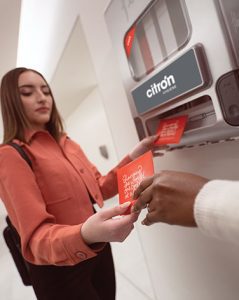


Incontinence
Worldwide, over 300 million people suffer from incontinence. It’s quite shocking to think that this represents around 5% of the total population yet it’s something that doesn’t get spoken about – not nearly enough anyway. In the UK, the number of people actually suffering from incontinence is nearer 10% showing that it is more prevalent in this country than other areas. There is still a strong stigma in society around talking about your bowel and bladder, and this is perhaps why it comes as a shock when you learn exactly how many people suffer from the condition – most people will only discuss it with their close family or doctors.
Incontinence has been found to be more common in females due to the impact from childbirth, pregnancy and other hormonal related factors however it is becoming increasingly common in males too. With age, the condition becomes more common in men, with prostate issues being one of the main causes. Weight gain can also be a cause as additional pressure is placed on the bladder causing urinary incontinence. In addition, incontinence can be brought on by stress and be a symptom of other conditions such as Parkinson’s.
Sadly, men are even more prone to hiding the issue as, unlike women who may be used to wearing pads and tampons for periods, men can feel shame about wearing pads which they have not been used to wearing before. As a result, the statistics are likely to be even higher than what is reported. You can find out more about incontinence and the causes in our blog.
It’s important to spread awareness of the issues relating to both male and female incontinence and the challenges people face when out in public settings to minimise the stigma and get the nation talking about something which is actually quite common.
Take a look around…
Use our virtual washroom to see how our solutions will elevate your washroom experience
Creating Inclusive Washrooms to Support Those Who Suffer with Incontinence


While there are a whole range of products on the market for those suffering with incontinence, including pads and incontinence underwear, disposing of products when away from home can be more of a challenge. It is because of this many people who suffer with the condition avoid going out, from fear of having to use a public washroom. Not being able to dispose of incontinence waste can be deeply distressing and have an impact on an individual’s physical and mental health alike. As incontinence is such as a common issue, to ensure people can go about their day safely and with confidence, all businesses should provide units for the disposal of incontinence waste in both male and female washrooms.
Even if people don’t suffer with severe incontinence, mild incontinence that causes leaks when out and about can still happen. In addition to providing waste bins, another helpful action that businesses can do to support people is displaying toilet maps across your facility so if someone needs to go to the toilet, they can be easily found and accessed.
In general, it’s vitally important that issues such as incontinence are talked about so people can have open and honest conversations with their friends and family, especially if they are suffering when in public spaces. This way, you can openly talk about sitting closer to a public washroom when out and about for example.
Gender Neutral Washroom Facilities
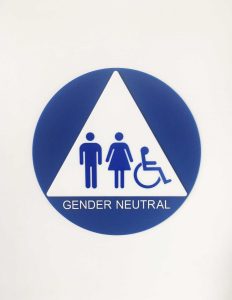

Recently, experts have argued that public toilets should be designed to be inclusive of everyone’s needs. It’s estimated that nearly half a million people in the UK identify as transgender and for these individuals; using a public washroom can lead to negative experiences. One transgender woman from Gloucester reports that when using public toilets, more often than not, she receives abuse. A United States survey also revealed that 59% of transgender people would avoid using a public toilet due to negative interactions with other users and in some cases, people have even been denied access to using the toilet.
While transgender individuals in the UK are free to choose their own toilets, associated attitudes and behaviours from others can lead to it being a very distressing situation when it comes to making the choice of which washroom to use. Therefore, in order to be more inclusive and ensure all washroom users feel safe to go about their business, having gender neutral toilets could help to tackle the issue. While there are both pros and cons to having these, making all washrooms inclusive of all identities. Without providing toilets that everyone can access individuals are losing their basic rights and, in addition to the emotional consequences, not being able to go to the toilet can lead to issues such as urinary tract infections and constipation.
Where gender neutral toilets are not possible, it’s important that sanitary waste bins and vending machines for menstrual care products are provided in all washrooms to accommodate for those who menstruate.
In the UK, the Government is currently conducting a review of publicly accessible toilets to ensure that there is diversity of provision and facilities for everyone. Find out more about the review.
FREE Washroom Hygiene Consultation
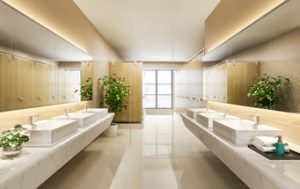


Learn how to create inclusive washrooms
Issues for Those with Disabilities
Gender neutral bathrooms can also help if carers need to assist their dependants in the washroom as separate disabled washrooms may often be busy or non-existent. They also help when it comes to parents and children. Parents with children of the opposite gender can often feel more comfortable using a gender-neutral washroom if the child needs changing or requires the toilet.
Using accessible toilets in general can be a problem for those with disabilities and caregivers too as standard toilets can be limiting and don’t provide the space that people need. To work towards tackling this issue, the Changing Places Consortium launched a campaign to increase the provision of Changing Places toilets to ensure the 250,000 people in the UK who cannot use standard accessible toilets have alternative toilets that they can use instead.
For businesses providing Changing Places toilets, it’s important to think about the fixtures and fittings needed to ensure they are safe and hygienic. This may include installing hand dryers and dispensers at a certain height for example.
Recently, the Government has taken steps to increase the provisions of Changing Places toilets to ensure all people have access to the toilet when they need it. The review has stipulated that any new, large buildings will have to now provide Changing Places toilets.
IBS & IBD
Individuals with conditions such as IBS and IBD can also face issues when using public toilets. Another common issue, IBS affects 20% of people in the UK and the condition usually starts between the ages of 20 and 30. IBS can have a significant impact on a person’s life due to the unpredictability of the condition that can cause a sudden urge to go to the toilet. Not being able to access a toilet quickly/easily or a lack of public toilets when out and about can be highly stressful. As with incontinence, supporting people by displaying maps of where the toilets are within your facilities can help those with IBS too.
For individuals with IBS, the ‘Can’t Wait Card’ can be issued which can be shown to public places such as stores and restaurants where you may need convenient access to a toilet. However, when actually using the washroom, other considerations should be made to ensure the experience is as pleasant as possible.
Ensuring basics such as toilet paper and soap is stocked is essential to supporting those with IBS. Read how one sufferer appreciates it when toilets are well ventilated and have appropriate air freshener to help mask any potential smells.
Create Inclusive Washrooms for Everyone
People face a myriad of issues when using washrooms away from home. These issues can have a whole range of emotional and physical consequences, therefore together as a society we should be raising awareness of them in order to instigate change.
No-one should have to plan their activities around using or not using a public toilet; to put a stop to this, we need to ensure washroom experiences are inclusive so everyone can go about their daily life confidently.
Businesses have a crucial role to play in making washrooms inclusive and accommodating for diverse needs.
Citron Hygiene wants to raise awareness of all the issues people face and can help your business tackle the issues with our range of washroom hygiene solutions. Talk to us to find out how we can help your business take one step further forward in providing an inclusive washroom experience today
